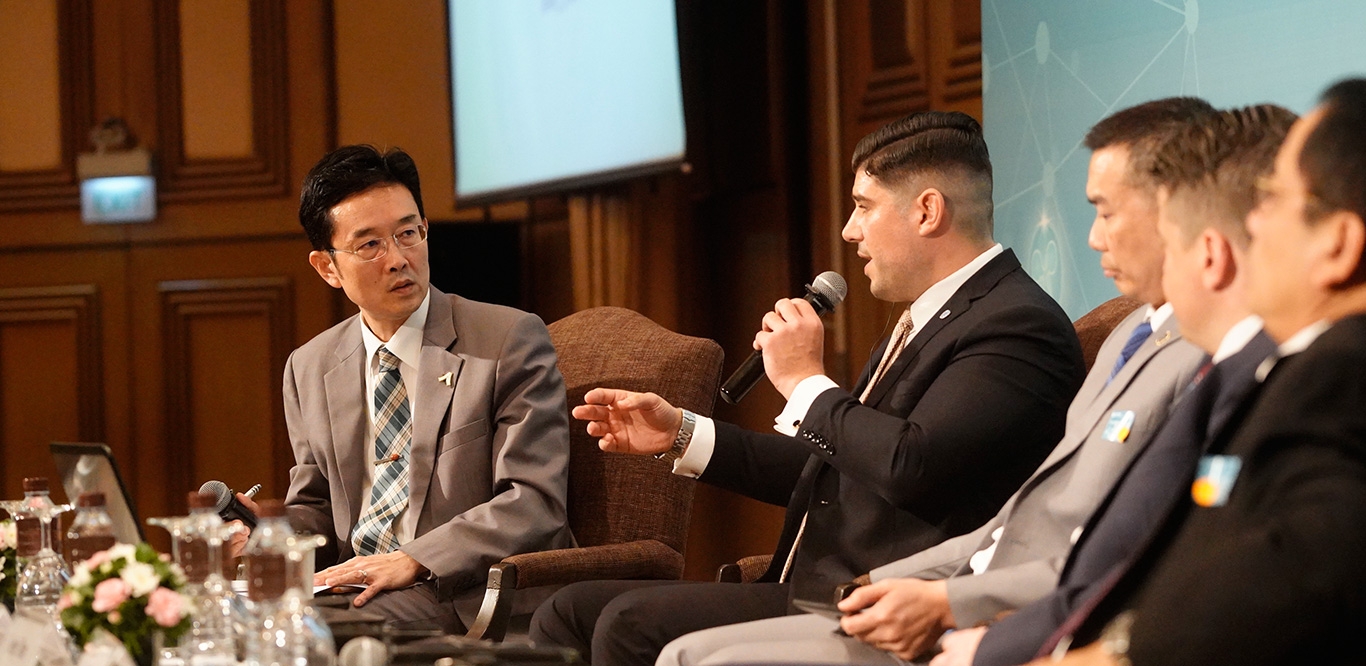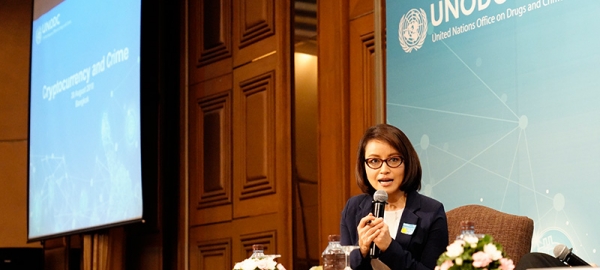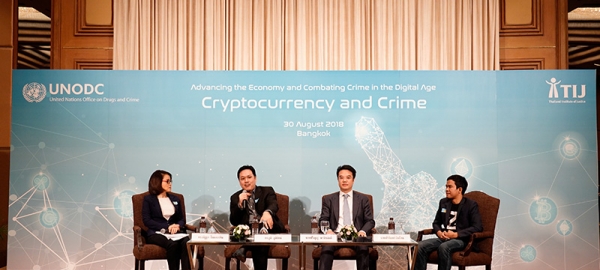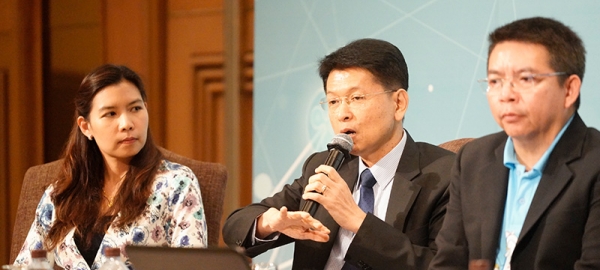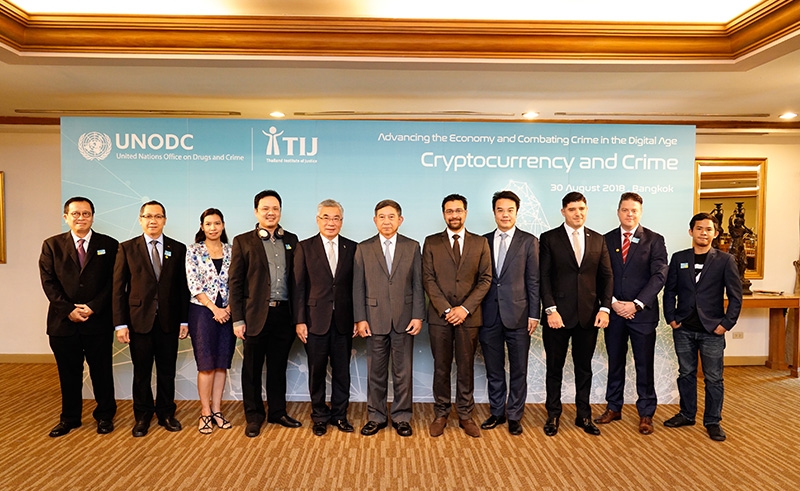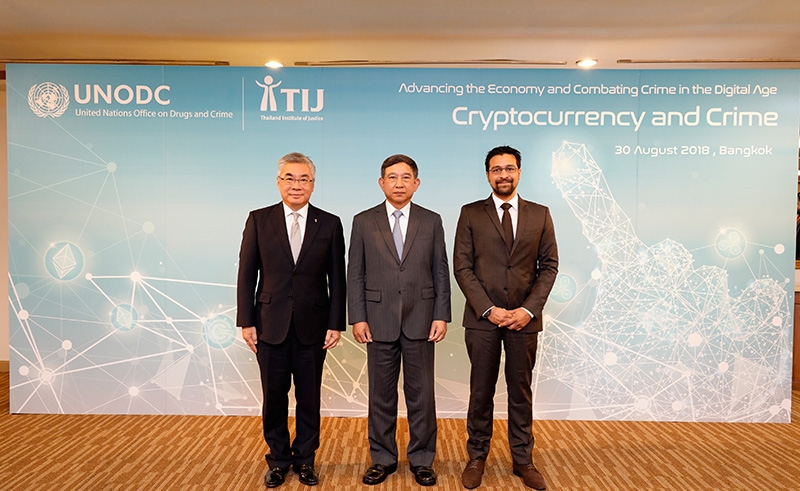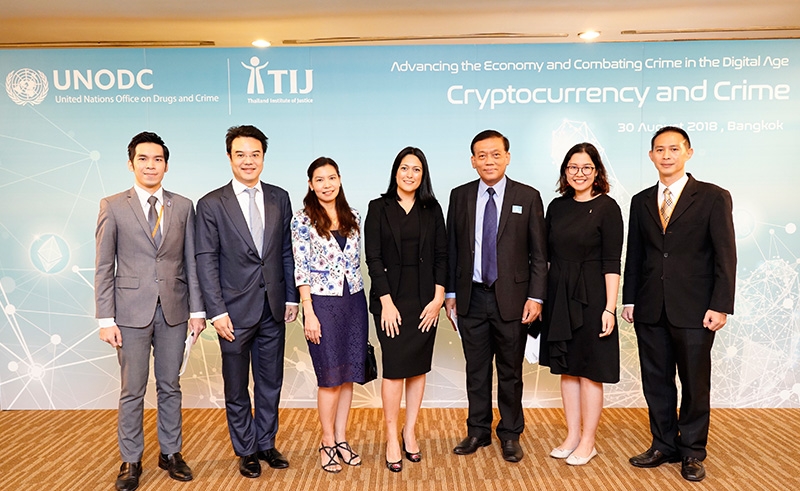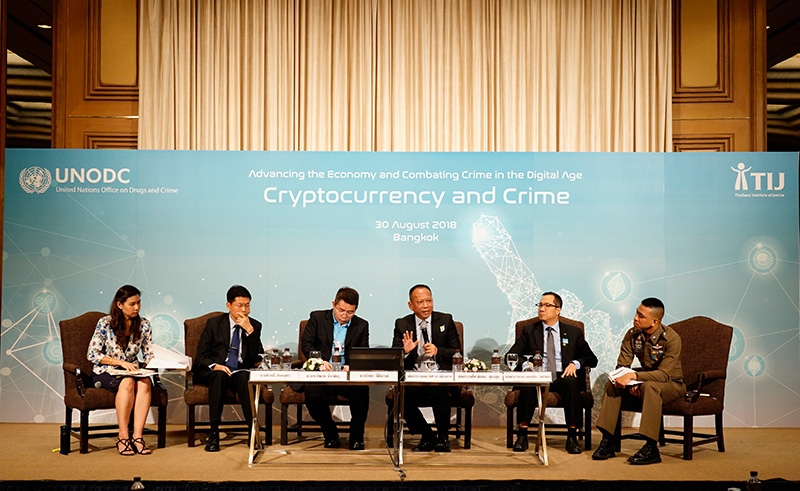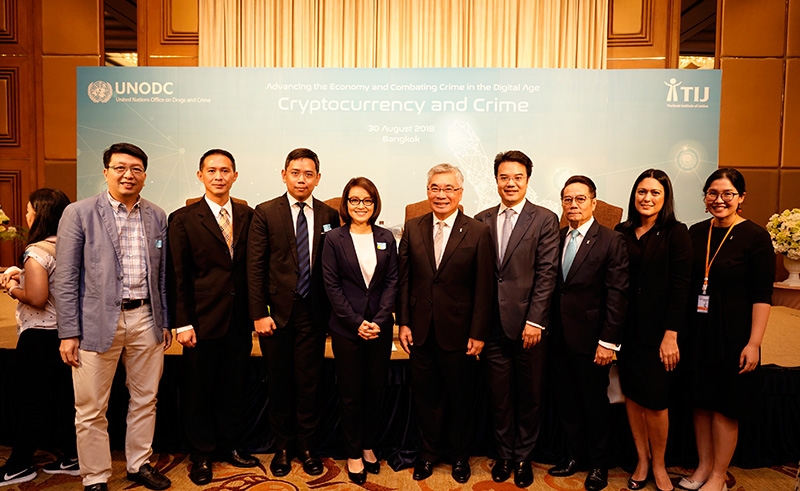Cryptocurrency and Crime New Responses for the Age of Technology
The Thailand Institute of Justice (TIJ), in collaboration with the United Nations Office on Drugs and Crime, Regional Office for Southeast Asia and the Pacific (UNODC), organized a seminar to explore effective solutions in combating cryptocurrency-related crime. In this seminar, practitioners, experts, law enforcements officers, and lawmakers joined hands to discuss and exchange knowledge, perspectives, and ideas on how justice institutions can benefit from the utilization and maximization of technology to prevent illicit activities and to respond to crime in this digital age
The seminar, entitled “Advancing the Economy and Combating Crime in the Digital Age: Cryptocurrency and Crime”, was held on August 30th, 2018 in Bangkok.
At the event, Air Chief Marshal Dr. Prajin Juntong, Deputy Prime Minister and Minister of Justice, and the Deputy Regional Representative of the UNODC, Mr. Julien Garsany, delivered the opening remarks. In his speech, Dr. Prajin stressed the nature of cryptocurrency as a monetary medium that could be used for both good and sinister purposes. While technology can be used as a tool to uplift and enhance economic capacity of nations, it is necessary to have appropriate regulatory measures that will ensure the transparent use of cryptocurrency.
The topics of discussion encompassed many aspects of cryptocurrency, including the history of cryptocurrency, its functions and application, and its legal and societal effects and ramifications on the society.
- Financial Technology Innovation and the Future of Money
The first session provided an overview of cryptocurrency, specifically on its types, functions, how it came to be, and how it will affect financial transactions, including its effects on FIAT money, such as cash and credit cards.
According to the discussions, the phenomenon of cryptocurrency can have profound effects in many areas such as information technology, financial regulations, and business transactions. The presence of cryptocurrency brings about new financial requirements and dilemmas; the transitions in the business transactions from conventional monetary medium, like cash, to digital currency, will necessitate further consideration of new security concerns.
As an expert on cryptocurrency, Mr. Poramin Insom, founder of Zcoin and the TDAX Crypto Currency Exchange, stated that understanding of the currency and the technology associated with cryptocurrency are very important. He stressed the need of the Thai government to embrace innovation, and to allow cryptocurrency to grow, as too much control can destroy technological innovation and understanding. Dr. Bhume Bhumiratana, consultant at the Securities and Exchange Commission, on the other hand, focused the importance of proper regulations; he stated that it is extremely vital to have proper regulatory frameworks, not dissimilar from those that govern conventional monetary mediums, and that cryptocurrency cannot exist without FIAT money. Governor on the Board of Governors of the Stock Exchange of Thailand, and director of the National Innovation Agency, Mr. Prinn Panitchpakdi, pointed out the needs to have fair and just application of regulatory measures. His statement pointed to the need to have proper and realistic goals and expectations in the development and application of such regulations.
- The Crypto Crime Wave
The second session focused on the global trends of cryptocurrency-related crime. The speakers of this session come from many background, both domestic and international. These experts introduced and discussed emerging types of new crime involving digital money; some reportedly significant trends are money laundering, terrorism financing, transnational crimes, and trafficking in person and drugs.
Mr. Alexandru Caciuloiu, Cybercrime Project Coordinator, UNODC Regional Office for Southeast Asia and the Pacific provided explanation on the nature of cryptocurrency. He stated that cryptocurrency operates on a platform known as ‘blockchain’, which act as a shared but decentralized server for cryptocurrency transactions. The heavily encrypted nature of cryptocurrency, combined with nigh-anonymous property make cryptocurrency very attractive to criminals. Another important aspect of cryptocurrency, he stated, is its abilities to bypass borders and regulations. As this technology is still relatively new and not yet clearly understood, regulatory and legal responses are slow. This allows criminals to use it for transnational crime. In response, regional and international cooperation is needed to prevent, detect, investigate, and prosecute criminals and their networks.
Apart from the representative from UNODC, key speakers of the second session also include Mr. Dian Ediana Rae, Vice Head of Indonesian Financial Transaction Reports and Analysis Centre FIU/PPATK; Pol. Lt. Col. Dr. Narin Phetthong, Specialized Officer, INTERPOL; and Representative from the Australian Federal Police
The experts expressed the opinions that it is necessary to assess laws and regulations from different countries as an effective measure to tackle these emerging threats. The speakers provided examples of good practices, measures, and policies from various countries, especially Australia, Singapore, and Indonesia. The speakers also emphasized the importance of cooperation between various nations’ law enforcement agencies, which will enhance their capacities and strengthen their efforts to prevent criminals and organized crime networks who seek to utilize cryptocurrency for illegal purposes.
- Justice Dialogue on Cryptocurrency Crime
The final session involved a panel discussion between various representatives of Thai justice entities, including Mr. Chartpong Chirabandhu, Deputy Director General of the Department of Special Litigation, Office of the Attorney General; Mr. Witthaya Neetitham, Secretary, Anti-Money Laundering Office; Pol. Col. Pisal Erb-Arb, Deputy Commander, the Narcotics Suppression Bureau; Pol. Lt. Col. Patana Sugarasut, Special Case Expert, Department of Special Investigations (DSI); and Pol. Capt. Ekkanit Natethong, Deputy Inspector Technology Crime Suppression Division, Royal Thai Police.
The panel exchanged perspectives on the many challenges faced by lawyers and law enforcement officers in dealing with cryptocurrency crime. In addition, examples of criminal cases involving cryptocurrency were provided, most notably, the “AlphaBay” case.
The speakers also highlighted the challenges faced by Thai law enforcement agencies and justice institution. The most pressing concerns, according to these experts, are the lack of technical knowledge and practical know-how, lack of appropriate equipment, and the confusing and inaccessible nature of the relevant laws. One major concern is the difficulty in gathering of digital evidence; as the law is not easily understood, there can be clashes in interpretations from various entities. Furthermore, due to the inaccessible nature of the legal mechanisms, the presentation and admissibility of such evidence in court could also be affected, rendering this problem a major cause for concern to the speakers. The panel concluded the discussion by stressing the importance of proper understanding of the technology and its subsequent regulatory measures, and the cooperation efforts by all sides, as the most important factors in combatting this emerging threat.
Technology is a double-edged sword, while it may be utilized to uplift and enhance the society, it may also be used by those with less scrupulous agendas to exploit and take advantage of others. It is therefore important to understand the principles behind both the value of cryptocurrency, and the technology of cryptocurrency itself. As the world moves inexorably forward, it is imperative that we as a society adapt and prepare for the future. One must bear in mind that cryptocurrency is a global phenomenon that will require insights from various entities from all levels, whether at domestic, regional, or international level. The new age brings with it new challenges and opportunities, and the only way to move forward is to understand the technology, and to properly embrace and manage it.
VDO Playlist: Cryptocurrency and Crime



